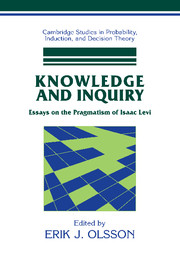Book contents
- Frontmatter
- Contents
- List of Contributors
- Preface
- Introduction: The Pragmatism of Isaac Levi
- 1 Isaac Levi and His Pragmatist Lineage
- 2 Is Pragmatist Truth Irrelevant to Inquiry?
- 3 The Knowledge Business
- 4 Infallibility and Incorrigibility
- 5 Why Inconsistency Is Not Hell: Making Room for Inconsistency in Science
- 6 Levi on Risk
- 7 Vexed Convexity
- 8 Levi's Chances
- 9 Isaac Levi's Potentially Surprising Epistemological Picture
- 10 Isaac Levi on Abduction
- 11 Potential Answers – To What Question?
- 12 Levi and the Lottery
- 13 The Value of Truth and the Value of Information: On Isaac Levi's Epistemology
- 14 Decision-Theoretic Contraction and Sequential Change
- 15 Deciding What You Know
- 16 Levi's Ideals
- 17 The Mind We do Not Change
- 18 Psychoanalysis as Technology
- 19 Levi on Money Pumps and Diachronic Dutch Books
- 20 Levi on the Reality of Dispositions
- 21 Replies
- Index
- References
8 - Levi's Chances
Published online by Cambridge University Press: 05 March 2010
- Frontmatter
- Contents
- List of Contributors
- Preface
- Introduction: The Pragmatism of Isaac Levi
- 1 Isaac Levi and His Pragmatist Lineage
- 2 Is Pragmatist Truth Irrelevant to Inquiry?
- 3 The Knowledge Business
- 4 Infallibility and Incorrigibility
- 5 Why Inconsistency Is Not Hell: Making Room for Inconsistency in Science
- 6 Levi on Risk
- 7 Vexed Convexity
- 8 Levi's Chances
- 9 Isaac Levi's Potentially Surprising Epistemological Picture
- 10 Isaac Levi on Abduction
- 11 Potential Answers – To What Question?
- 12 Levi and the Lottery
- 13 The Value of Truth and the Value of Information: On Isaac Levi's Epistemology
- 14 Decision-Theoretic Contraction and Sequential Change
- 15 Deciding What You Know
- 16 Levi's Ideals
- 17 The Mind We do Not Change
- 18 Psychoanalysis as Technology
- 19 Levi on Money Pumps and Diachronic Dutch Books
- 20 Levi on the Reality of Dispositions
- 21 Replies
- Index
- References
Summary
Isaac Levi and I are old friends who have argued for decades about philosophical topics that interest us. Although – or perhaps because – we often disagree, I have learned more from our debates than I sometimes admit. So I was especially pleased to be asked to contribute to this volume, and what follows is offered with respectful affection if not with much hope of inducing complete agreement.
Levi (1977, pp. 186–7) stresses “the fundamental importance … to the understanding of the conception of chance … of providing an account of direct inference,” as opposed to “the gratuitous, diversionary and obscurantist character of such ‘interpretations’” as von Mises's (1957) frequency theory and my (1971) and other propensity theories. Levi's own theory of chance (1980, chs. 11–12) amply meets his own desideratum. In doing so, however, it differs less than he thinks from its rivals.
DIRECT INFERENCE
By “direct inference” Levi means a principle “which stipulates how knowledge of chances … determines credal judgments about the outcomes of trials on chance setups” (1980, p. 86), where “credal judgments” means what he calls credal probabilities, which for brevity I call credences, “to be used in practical deliberation and scientific inquiry in computing expectations” (1977, p. 165). He illustrates his principle as follows.
Suppose X knows the following bits of information:
(i) The chance of coin a landing heads on a toss [of kind S] is .5 and of landing tails is also .5.
(ii) Coin a is tossed at t.
(iii) The toss of a at t is also of kind T.
- Type
- Chapter
- Information
- Knowledge and InquiryEssays on the Pragmatism of Isaac Levi, pp. 111 - 124Publisher: Cambridge University PressPrint publication year: 2006

